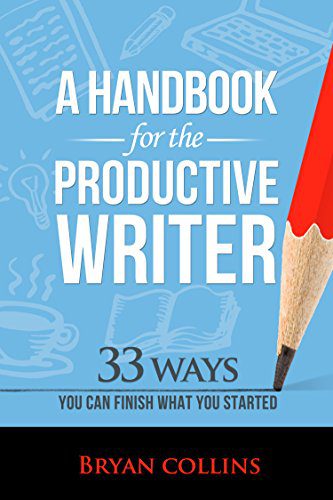Book Review: A Handbook for the Productive Writer – 33 Ways You Can Finish What You Started

As a freelance writer, I hit road blocks from time to time.I find it hard to really get in and get the job done for myriad reasons, from the project, the deadline or what is going on in my personal life. Whether it’s the inability to concentrate or a lack of inspiration, I really don’t have go-to method for getting out of my funk. I recently picked up Bryan Collins’ book, A Handbook for the Productive Writer – 33 Ways You Can Finish What You Started to gain some clarity and useful tools for the next time I have problems moving forward with a project. I am going to share my book review with you as I think it will be helpful for many writers out there, and extract a few of the most helpful tips I gained from the book so you can see if they worked for you as they did for me.
The book review: what the book was about
Collins’ book is truly crafted for writers of all genres and I found his insight very useful. He first begins the book by suggesting various writing prompts that might help the writer get out of his/her inspiration rut. I have always found writing prompts useful, but I rarely use them. The writing prompts are used as a warm-up “workout” to the main “race”. When preparing to do actual physical activity, if you don’t warm up and stretch a bit, you are more prone to injury. The writing prompts acted as a warm up; I found they helped me flush out random ideas and thoughts before working on the main project. In addition, writing prompts and free writes, as Collins suggests, help a writer get his/her thoughts flowing without constraint or worry about grammar and sentence structure. Collins says, “Free writing only works if you don’t question or criticize every sentence…let the words flow freely from your fingers onto the paper without pausing or questioning what you are saying.”
Finding focus: advice to writers
To focus your mind on the project at hand, Collins also advises writers to stop and organize their expectations about, thoughts for and challenges of the project. I will be the first to admit that I am a fan of a good list. I am drawn to its simplicity and ease at which one can read and process it. A few lists he suggests are:
– ten headlines
– ten interviewees you can source
– ten strengths/weaknesses of your topic
– ten questions you need answers to and
– ten ways to open and close your story with a bang.
Other recommendations
In the book, Collins also mentions the importance of the setting SMART goals for one’s writing projects. These goals would serve as a guide to assist the writer with staying on track and working toward a final product. SMART is an acronym: specific, measurable, achievable, realistic and timely. Collins notes that each project has a desired outcome and writers should write down all the actions needed for each one. It is important to make these goals visible and check back routinely to ensure the plan is being executed.
Freshening your approach
One of the final pieces of advice Collins gives in the book is that it’s ok to tell a little lie. I really enjoyed this chapter because I realized that at times, my blockages stem from my inability to write copy I think is “profound”. I get stuck trying to be original or sound like the ultimate “expert”. There’s nothing wrong with exploring other avenues or wanting to present a project in an original way, but if it keeps me from getting my work done then there’s a problem. According to Collins, I need to tell myself that I do indeed have something original and new to say (even when I don’t feel that way). “You can use a white lie to freshen up the way you write about an old topic.” Collins adds, “I’m not suggesting you [writers] willfully mislead your reader. Instead, the productive writer sometimes turns a fact on its head and attacks their project from a new and exciting angle.” Many times, that is all a writer might need to gain a little momentum to get the job done.
In all, writing can be an arduous process at times. It is important for us, as writers, to keep it fresh as we work and seek ways to hone our craft. Whether it be from an easy project or one that is causing us some trouble, Collins’ book offers insightful solutions to problems large and small.
Reach Out
Be Social
Content Marketing
Next In AI
Use AI to Inspire Your Writing: 7 Tips to Spark Creativity
Explore 7 tips to fuel your writing with AI, from sparking creativity to enhancing your style with Eve Connell's expert...


